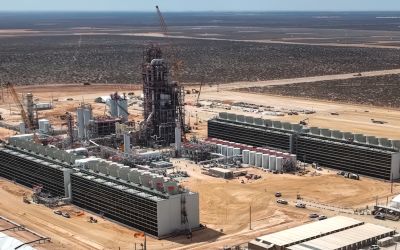Elliot David on how bitcoin can support a sustainable investment strategy
Can Bitcoin truly support both profitability and planet-friendly investing?
.png)
As investors look to align their portfolios with net-zero and ESG goals, Bitcoin is emerging as an intriguing yet controversial asset. Despite common misconceptions its environmental impact, Bitcoin offers unique financial opportunities that can support a sustainable investment strategy. Sustainable Bitcoin Protocol’s Head of Climate Strategy Elliot David talked to Climate Action to demystify some of concerns around Bitcoin, explore the real benefits of integrating it into an ESG-aligned portfolio, and discuss how net-zero investors can capitalise on Bitcoin’s growth potential without compromising their commitment to decarbonisation.
What would you say to critics who argue that Bitcoin’s energy consumption outweighs its societal benefits? Are there ways in which Bitcoin contributes to sustainability efforts that are often overlooked?
In order to properly evaluate bitcoin’s energy use, we need to first understand its value as a technology, in comparison, we justify AI’s energy use because we understand its utility. Bitcoin has grown to become one of the biggest asset classes in the world in just 15 years because it offers numerous benefits to society such as financial inclusion for the unbanked, a store of value for nations facing inflation, and more.
Bitcoin’s energy use is often maligned, with some making comparisons to the energy consumption of entire countries like Norway. In reality, bitcoin mining uses roughly 0.25% of global energy, which may seem small, but this number will continue to grow over time. It may seem counterintuitive, but adding this new demand for electricity actually have a decarbonizing effect on the energy system.
Bitcoin mining has many similarities to the traditional data centre industry that powers digital services, but a few key differences indicate it has the power to be an ally in the energy transition. Compared to traditional computing, bitcoin mining is flexible, location-agnostic, and interruptible, as well as highly sensitive to price. This is what gives Bitcoin mining the ability to support a greener and more stable grid. Its ability to provide demand response can support the growth of renewable energy according to the IEA. It can eliminate and monetize stranded methane, which is one of the most critical ways to address global warming, and companies like MARA are even recycling heat from bitcoin mining to warm a community in Finland. Bitcoin mining can even be utilized to bring electricity to the nearly 1 billion people in developing economies who don’t have access to clean energy.
What types of data should miners be sharing to enable investors and stakeholders to assess their environmental impact?
To enable investors and stakeholders to make informed decisions, it’s important for bitcoin miners to share key data related to energy consumption, energy sources, and emissions. Specifically, the type of energy used—whether renewable, fossil-based, or grid mix—provides crucial insights into a miner’s carbon footprint. Sustainable Bitcoin Protocol (SBP) is leading the way in collecting and verifying clean energy data from bitcoin miners and incentivizing decarbonisation. By disclosing energy use and to SBP and being issued Sustainable Bitcoin Certificates (SBC), miners can offer transparent and verifiable data that investors can rely on to evaluate their environmental performance.
Moreover, miners should align their reporting with global sustainable investing frameworks such as the Greenhouse Gas Protocol, CDP, SFDR, and TCFD. As the industry matures, this alignment will become increasingly critical for demonstrating sustainability credentials. For instance, Marathon Digital Holdings (MARA) recently became the first bitcoin mining company to submit a disclosure to CDP, setting an important precedent for the sector.
Publicly traded miners, in particular, have a unique opportunity to leverage voluntary disclosure frameworks like SBP to communicate data that matters most to shareholders—environmental risk, sustainability efforts, and broader societal impacts. Through SBCs, bitcoin miners can not only build trust with stakeholders and demonstrate their commitment to sustainability, they can enable inventors to make more informed and responsible investment decisions.
How can SBCs support net-zero investors in achieving their goals while still participating in the Bitcoin economy?
Bitcoin has been the best-performing asset class since its inception, and climate investors want to gain exposure but are understandably concerned about investments that conflict with their net-zero goals. Sustainable Bitcoin Certificates (SBCs) offer climate-conscious investors a unique opportunity to invest in bitcoin in a way that goes beyond climate neutral, but rather enhances sustainability of their portfolios. Through Sustainable Bitcoin Protocol (SBP), SBCs provide verifiable proof that investors’ bitcoin holdings are additive to the energy transition and that they are directly driving the decarbonisation of the bitcoin mining sector.
For climate investors, SBCs offer a layer of transparency and accountability that aligns with key ESG standards, including frameworks like the Greenhouse Gas Protocol, SFDR article 8+, and possible SEC climate disclosures. By purchasing Bitcoin with SBCs, investors can be confident that their participation in the digital asset space is aligned with global sustainability efforts, as SBCs are certified to reflect Bitcoin that has been mined with verified clean energy in a way that preserves fungibility.
This alignment is critical for investors looking to balance financial returns with environmental stewardship. The voluntary disclosure enabled by SBCs also supports investors' need for credible data, ensuring their portfolios can meet stringent ESG criteria. Moreover, SBCs provide an avenue for companies to demonstrate their sustainability leadership within the cryptocurrency space, setting a higher standard for responsible Bitcoin investment.
In essence, SBCs allow net-zero investors to benefit from Bitcoin’s financial upside while maintaining their commitment to decarbonisation and aligning with ESG frameworks—ensuring sustainability and profitability can go hand-in-hand.
What assurances or mechanisms are in place to ensure that SBCs are not just a form of greenwashing but actually lead to measurable environmental benefits?
Sustainable Bitcoin Certificates (SBCs) are designed with rigorous mechanisms to ensure real environmental impact, not mere greenwashing. Sustainable Bitcoin Protocol (SBP) was established precisely to create a transparency layer for the Bitcoin network, ensuring that clean energy usage is verifiable and measurable. Unlike many traditional assets, Bitcoin and SBCs offer exceptional transparency due to the Bitcoin protocol’s public nature and the fact that Bitcoin’s emissions come almost exclusively from Scope 2, or electricity purchases. This makes Bitcoin’s environmental footprint fully auditable and significantly reduces greenwashing risks.
SBP tracks and verifies the energy consumption of mining companies down to each megawatt-hour (MWh) and audits every environmental attribute tied to SBC issuance. This thorough verification, coupled with regular audits from reputable third parties, ensures the highest standard of data integrity and accountability. Additionally, all data collected to issue SBCs is fully auditable, providing greater sustainability transparency than even traditional data centres.
Moreover, blockchain technology offers robust transparency in tracking clean energy use and prevents double-counting of environmental claims, further reinforcing SBCs’ reliability. As such, SBCs are positioned to make Bitcoin one of the first transparently climate-positive financial assets. This assurance enables climate investors to confidently participate in the Bitcoin economy, knowing their investments lead to verifiable and measurable environmental benefits, setting a new standard for sustainable finance in the digital asset space.






